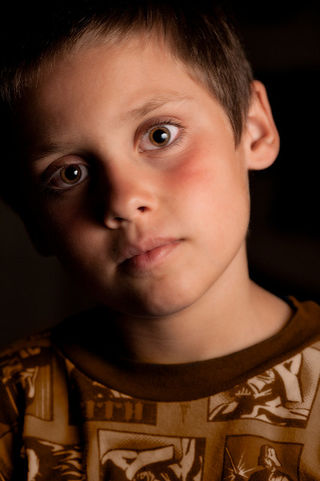Resilience
How Should You Talk to Your Child About the Holocaust?
Why talk about the Holocaust, and when?
Posted November 7, 2018 Reviewed by Jessica Schrader

When she was 7, one of my daughters came home from school with an urgent question about the Holocaust. She had heard something from one of the other children about an atrocity a long time ago where children and their families were taken to terrible places, just because they were Jewish. She said there was a man named Hitler, and terrible things happened, and most of the people died. She was deeply worried about it. “Is that true, Mom?” she asked. “How could that happen? Will it happen again?”
Before I tell you how I answered her, and how I think parents can help their children understand the Holocaust, let me say that I am not Jewish, and I lost no relatives in that dark period in our collective history. What I do bring to the table is some understanding of how children develop, and what parents and others can do to support children’s coping, resilience, and capacity to contribute productively, over time, to a healthier society where this kind of atrocity never happens again.
Every family has its own unique history and situation; every child’s personality and experience is unique, as is every parent’s. And so, the Holocaust becomes relevant in different ways and at different times in different families. For some, the trigger for talking about the Holocaust is a story a child has overheard at school or on the playground, as happened with my daughter. For others, it’s hearing family members talk about it, sometimes in an oblique way that the child can’t quite grasp. Sometimes there is something in the news—like last week’s shootings in Pittsburgh—that worries kids and reminds parents of the necessity for vigilance.
Why Should You Talk to Your Child About the Holocaust?
Knowing about the Holocaust ...
- Teaches the importance of tolerance, respect, and inclusion. The Holocaust is a dramatic lesson on the vital importance of respect for each person, regardless of race, religion, age, wealth, or anything else that might separate us from each other.
- Illustrates the dangers of hate speech. It helps children learn about the invidious power of hate speech, the ways that playing on people's fears leads, slowly but surely, to people acting—sometimes with prejudice, sometimes with violence—on those fears.
- Informs accurately. Your children will hear about it anyway, and it is best they learn about it in an environment where the facts are presented knowledgeably, without embellishment, addressing and preventing fears and misconceptions.
- Supports resilience. It may seem counterintuitive, but children are less anxious when they know more about the hazards of the world around them. Children worry when they hear about scary events that are beyond their control, and they worry even more when they feel the adults in their lives are keeping secrets from them, trying to protect them from that knowledge.
- Prevents future atrocities. Learning about the history of the Holocaust—how it started, how it developed, how it grew—is the best possible prevention of another one. It is the best insurance that our children will grow into adults who are vigilant to the dangers of creeping anti-Semitism, as well as other forms of racism, sexism, and intolerance of others. I don’t think it is an overstatement to say that this may be the single most important lesson kids need to learn, for the survival of the planet.
In brief: Remember, it didn’t start with gas chambers. It started with politicians dividing the people with "us vs. them." It started with intolerance and hate speech, and when people stopped caring, became desensitized, and turned a blind eye, it became a slippery slope to genocide.
At What Age Should You Talk to Your Child About the Holocaust?
When my grandson was in first grade, his school—a public school in Toronto—marked Holocaust Remembrance Day by sharing horrific details, including the fact that children and whole families had been taken out of their homes, and sent to showers where they died. Theo is an imaginative, sensitive, and empathetic child, and it took a long time before he stopped having nightmares about this.
I am very happy that educators are beginning to recognize the importance of Holocaust education, but 6 is way too young for a child to make good sense of details like this. Most of the material produced by the United States Holocaust Memorial Museum is targeted for age 11 or 12, and not earlier. There is a general consensus among Holocaust educators that eight is the earliest age to begin, although if kids ask about it, as Theo did, no matter their age, it’s time to answer in an age-appropriate way.
How to Talk to Your Children About the Holocaust
- Take a deep breath. Take stock of your own emotions before talking about the Holocaust with your child, or attempting to address your child’s concerns. Your child needs you to be calm and confident, to reassure them that you will keep them safe.
- Start slowly. In the beginning, keep it brief. If you go slowly and listen, your child will let you know how much information they want.
- Be honest and positive. Affirm the hard reality. Don’t give your child more than they need to know, but don’t sugar-coat the truth, either. Your child is sensitive to evasion and will be reassured by straightforward honesty. It helps them feel more secure in a dangerous world if they feel they can trust you to tell them the truth.
- Listen deeply, and reassure. Your child may not be able to articulate the questions they’re worrying about. If they’re under twelve and ask, “Why did the Holocaust happen?” for example, they’re probably not wondering about the history and politics of the time, but rather something closer to home, like “Might this happen to us?” A short, honest, and reassuring answer for a young child would be something like, “The Holocaust happened a long time ago where people were allowed to be mean to other people. We have laws against it, and we have police officers and judges and others who are working to keep us safe.”
- Emphasize tolerance. The beginning stage of Holocaust education is about tolerance, thinking about bullying and inclusion in your child’s world, their classroom, and community. Examples might focus on including children with learning or developmental differences.
- Address issues of peer pressure. The next stage addresses bystander effects, showing your child why it`s important to speak out against injustices they encounter in their daily lives. Teach your child to say no to bullies, whether or not your child is the target.
- Later, discuss the context that led to the Holocaust. Only later, once kids get into middle and high school, do they have the cognitive maturity to grasp political context and complexity. Only then does it make sense to bring in some of the more horrifying details, and help them understand their responsibility for vigilance and civic engagement.
- Think together about ways you and your child can reach out and make a difference. You might decide to do a daily mitzvah, or good deed. There may be children in your community from minorities or marginalized families who can benefit from kindness and inclusion.
- Be creative. Help your child find avenues of creative expression, whether musical, visual, linguistic, or some other medium. As Joanne Foster writes, creative expression can be a source of solace and strength.
- Remember that love is stronger than hate. Affirm your child’s (and your) reasons for anger and fear, and help your child move toward constructive actions that fight every kind of bullying, bigotry, and prejudice, including anti-Semitism.
- Have faith in your child’s resilience. Yes, it is a dangerous world, and there are reasons for fear. But you can use the lessons of the past to help your child feel empowered by helping to create a world that is safer, kinder, and more loving.
- Model tolerance, respect, and civic engagement. The best way to make sure your child grows up to understand the lessons of the Holocaust is to live those lessons yourself. Your child is paying deepest attention to the walk you are walking. Involve yourself in issues of social justice. Sponsor a refugee family, help out at a soup kitchen, be politically active; find a way to give back and help make the world a better place for us all.
Seek help if necessary. Some children are more deeply affected than others by events like the Pittsburgh synagogue shootings or learning about the Holocaust, and sometimes parents need professional help managing a child’s anxiety. Getting it early can be important to a child’s ongoing mental health.
What Did I Tell My Daughter?
I was in the midst of making dinner, with a packed evening planned, and no time to spare, but thankfully I recognized that this was one of those moments when everything else would just have to wait. I poured my daughter a glass of milk and made myself a coffee. I invited her to sit down with me and tell me again exactly what had happened at school that got her worried.
I acknowledged that the information she’d heard was mostly right. There had once been a very bad man named Adolf Hitler who had waged a campaign on Jews and many others. “Yes, a lot of people died in the Holocaust,” I told her. “It was a terrible, terrible, time, and it’s good that we remember it, so that we can make sure it never happens again.” From there, we moved to actions we could take—she and I, and the rest of our family—to keep the world safe from any possible future Hitler.
By the end of that conversation, my daughter felt stronger and happier. Questions followed later, of course, but she was calm enough to help me set the table and get some playtime in before dinner.
Conclusion
There are so many reasons it is important to talk to your children about the Holocaust. By paying attention to your child’s questions and worries, you can support them in feeling empowered to be the difference in a society that desperately needs that.
Disasters like the Pittsburgh synagogue shootings can provide opportunities for parents to help their children learn how to manage their feelings, confront challenges, and acquire resilience. By providing a safe environment, and being calm and attentive—and seeking professional help if that’s needed—parents can alleviate the fear, dismay, or confusion children often experience during chaotic times, as well as helping them develop coping skills that will serve them well going forward.
This post is based on a talk I gave in Toronto for Holocaust Education Week, for a consortium of organizations including Facing History and Ourselves, the Mabin School, the Paul Penna Downtown Jewish Day School, and the Dr. Eric Jackman Institute of Child Study.
References
“Teaching about the Holocaust,” by the United States Holocaust Memorial Museum
“Five Ways to Talk to Children about the Holocaust,” by Keyonna Summers
“How Do You Explain the Holocaust to a Child?” by Leonard Kniffel
“How to Talk about the Holocaust,” by Rabbi Sarah Reines
“Discussing the Holocaust with Children,” by Ann Moline
“9 Essential Lessons for Teaching the Holocaust,” by Jessica McFadden
Roots of Action, by Marilyn Price-Mitchell
Connect Four Parenting, by Andrea Nair
“Creative Expression: A Source of Solace and Strength,” by Joanne Foster
The Fear Fix: Solutions for Every Child’s Moments of Worry, Panic, and Fear, by Sarah Chana Radcliffe
“How to Support Kids’ Coping, Resilience, and Mental Health,” by Dona Matthews
“Helping Kids Handle Terrible Events in the News,” by Dona Matthews and Joanne Foster




